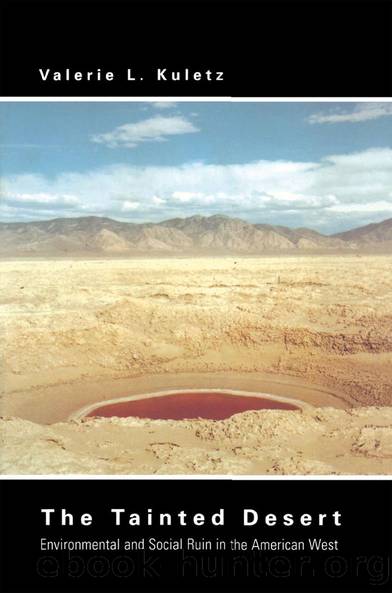The Tainted Desert by Valerie L. Kuletz

Author:Valerie L. Kuletz [Kuletz, Valerie L.]
Language: eng
Format: epub
Tags: Social Science, Sociology, General
ISBN: 9781134954261
Google: Dm4WDAAAQBAJ
Publisher: Routledge
Published: 2016-04-29T05:09:10+00:00
Collaborations
Both of the cultural resource studies done at Yucca Mountain can be seen as complex ongoing postcolonial documentsâonly this time they are the co-(re)creation of a repressed culture by both the repressor and the repressed. A critical examination of the process allows us to see how culture actually changes and develops in the real world. Cultural identity is not a static, self-contained organic entity, but rather results from struggles within power relations, from alliances between unexpected agents from opposing ideological encampments, from a politics of care and compassion on both sides by those who attempt communication with the otherâeven when bound within agonistic constraints (as are the cultural resource anthropologists and Indian overseers). While such a positive spin may be difficult for many to accept because such studies seem like one more nail in the cultural coffin of Indian peoples, these documents (in some cases, at least) serve to help define Indian identity in the nuclear landscape and reestablish a historical presence that had been all but eradicated. For instance, Paiute women from the Owens Valley told me how compiling the ethnobotanical information into one volume (the DOE-funded report titled Native American Plant Resources in the Yucca Mountain Area34) helped them to learn about the flora of their own traditional area and how their ancestors used it for food, building materials, and medical purposes. Thus, white social science helps to both preserve and reconstruct a culture that white society itself has been, until very recently, and to some extent still is, hell-bent on destroying.
Without denying the problems inherent in one cultureâs narrating another when the other is colonized as severely as are American Indians, it is important to note that some Indian people view positively the disciplines of archaeology, anthropology, and ethnography that have charted these colonized cultural domains. Some felt that they learned a great deal from white experts and consequently praised their work. Unlike Western Shoshone, Owens Valley Paiute Indians expressed respect for Richard Stoffle and his work, citing his efforts to represent the Indian world view. Similarly, one woman told me how she had read all of Julian Stewardâs anthropological books on the Great Basin Indian cultures to learn about her tribeâs past. Another felt that ethnographers actually saved a lot of Indian knowledge that would have otherwise been lost in the severity of forced assimilation:
We didnât have a written language. I mean we didnât have any writing at all, so much of it [cultural knowledge] got lost. I figure that the people that came a long time ago and talked with the Indians that were around then, well, communication was nil at best. Because the Indians couldnât speak English, and those white people couldnât speak Indian. So the early anthropologists did the best they could but the Indians told them then what they were doing way back. Thatâs more than what we know. But that was a long time ago. Thatâs why I feel sometimes a lot of that stuff some anthropologists got wrong in some places, they had it mixed up.
Download
This site does not store any files on its server. We only index and link to content provided by other sites. Please contact the content providers to delete copyright contents if any and email us, we'll remove relevant links or contents immediately.
| Alternative & Renewable | Drilling Procedures |
| Electric | Fossil Fuels |
| Mining | Nuclear |
| Power Systems |
Whiskies Galore by Ian Buxton(40511)
Introduction to Aircraft Design (Cambridge Aerospace Series) by John P. Fielding(32346)
Small Unmanned Fixed-wing Aircraft Design by Andrew J. Keane Andras Sobester James P. Scanlan & András Sóbester & James P. Scanlan(32148)
Craft Beer for the Homebrewer by Michael Agnew(17463)
Turbulence by E. J. Noyes(7058)
The Complete Stick Figure Physics Tutorials by Allen Sarah(6648)
Kaplan MCAT General Chemistry Review by Kaplan(6066)
The Thirst by Nesbo Jo(5793)
Bad Blood by John Carreyrou(5782)
Learning SQL by Alan Beaulieu(5424)
Weapons of Math Destruction by Cathy O'Neil(5046)
Man-made Catastrophes and Risk Information Concealment by Dmitry Chernov & Didier Sornette(4749)
iGen by Jean M. Twenge(4707)
Digital Minimalism by Cal Newport;(4568)
Life 3.0: Being Human in the Age of Artificial Intelligence by Tegmark Max(4520)
Audition by Ryu Murakami(4107)
1,001 ASVAB Practice Questions For Dummies by Powers Rod(4046)
Electronic Devices & Circuits by Jacob Millman & Christos C. Halkias(4041)
Pale Blue Dot by Carl Sagan(4017)
